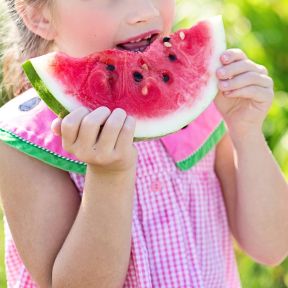Choosing to eat in a healthier manner, without the restrictions of dieting, involves an important shift in mindset. Dietary thinking is often associated with rigidity, self-blame, and feelings of failure. Thoughts like these can reduce feelings of agency, induce pressure, lower self-esteem, and ultimately even push you toward giving up, fasting, dieting, losing control, or rationalizing.

Instead, replace those thoughts with energizing, practical, and loving thoughts that support your desire to take care of yourself through healthy eating, diet-free. Following are 5 evidence-based thoughts that you can engage in to support healthy, relaxed eating. Each person’s mind is unique, so give each of these thoughts a try and see which is most effective for you.
"Relaxed eating is the ability to be at ease with the social, emotional and physical components of food and eating. Relaxed eating is attuned to the body’s hungers and intuitively provides for its needs. It is the ability to listen and satisfy your hunger allowing for pleasurable and whimsical eating with flexibility and the absence of remorse." —Sondra Kronberg, MS, RD, CDN, CEDRD-S
1. “I am a Healthy Eater" or "I am a Relaxed Eater.”
Our first recommended thought type is based on research led by Justina Paluckaitė, who uses the theory of self-schema, or self-identity, as a possible pathway for facilitating healthy or relaxed eating through increased positive, yet gentle control.
This kind of thinking moves the emphasis away from individual action—e.g., what do you want to do right now?—and toward identity—e.g., What kind of person are you, and how would that kind of person act right now?
The first part of this theory looks at how identity is managed through self-talk. In this context, the thought, “I am a healthy eater,” is a way of affirming your identity as someone who eats well.
Humans love to categorize themselves and others. This important heuristic helps us navigate through an overwhelming amount of information and complexity in the world. You can use this heuristic to your advantage. Putting yourself in the box of “healthy eaters” or "relaxed eaters" is more likely to trigger helpful action pathways in your brain as you come to associate with that identity rather than describing yourself as a dieter, a mindless eater, or an out-of-control eater.
2. “Healthy Eating or Relaxed Eating Is Important.”
Multiple studies show that self-schemas predict consistency in eating. Values are another pathway linked to self-schema—or the perceived importance of healthy eating.
If you’re struggling to convince yourself of your new identity as a healthy or relaxed eater, try this second aspect of self-schema thinking: letting yourself know that you value healthy or relaxed eating because it’s important to you.
Humans tend to prioritize actions meeting the needs that are most important to them. It may seem that you procrastinate following up on important emails, and thus are not acting on what is important, but have you considered that rest and fun are more important to you than checking emails at that moment?
In this vein, consider casting the net wide and deep to find ways to give healthy or relaxed eating high importance. Does it impact your energy? The love you have to give? Setting and moving toward your goals? The drive to create? Notice which thoughts reinforce the importance of eating well, most of the time.
3. “What would [your name] do?”
Some people may find connecting deeply with identity and beliefs a little too confronting. They may lack self-connection skills but have copious skills in helping others. You can harness this “helping” nature with the use of distanced self-talk, our third recommended thought type, based on research by Furman et al (2020).
Distanced self-talk involves using first-person pronouns and names during self-talk and thoughts. Instead of saying, “What am I going to eat right now,” a person named Emily using distanced self-talk might use a thought such as, “Emily, what are you going to eat right now?”
In their study, Furman's team found that participants who used distanced self-talk chose healthier foods. In addition, in participants who weren’t dieters, this benefit occurred without having to have had any health goals primed first.
4. “This apple is crunchy, cold, and juicy.”
The concept of mindfulness has been in the popular consciousness for a while now. Jon-Kabat-Zinn, who has created leading mindfulness-based stress reduction programs, describes the practice as "paying attention in a particular way, on purpose, in the present moment, and nonjudgmentally." Mindful thoughts can also be a powerful tool for healthy, non-diet-based eating. By bringing yourself into the moment, and into what’s alive in you, mindfulness promotes an intentional and savoring attitude that lends itself to enjoying various aspects of what you eat and making healthier choices.
So, how do we construct a mindful thought when wanting to support healthy eating choices? One way is to mentally annotate sensory observations about food while consuming it: For example, “I am feeling this cool apple juice slide down my throat.”
You might also choose to connect with how you feel, as certain bodily sensations of stress may be unconsciously driving you toward less healthy and conscious choices.
5. “I am kind to myself.”
Self-compassion is another helpful concept related to thinking that supports a healthy or relaxed style of eating. Rather than focusing on external and bodily observations, self-compassion focuses specifically on identifying negative self-talk and paying attention to how it feels when you replace those distressing thoughts with kinder language.
In the work of Hussain (2021), self-kindness was linked to the choice of grape consumption in participants who were low fruit and vegetable consumers. It didn’t have an impact on participants who already ate well on this metric. This technique is exciting news for people who are new to a healthy eating journey. If your habits tend away from fresh fruit and vegetables, you can begin expressing thoughts of self-kindness to try to increase your intake of these foods.
Thoughts such as, “How could this snack be a way of taking good care of myself right now?” may support you on this journey.
Pay Attention to Your Mindset
These mindsets can support you in your kind, relaxed, non-diet-based eating intentions.
- Self-identity and values
- Self-compassion
- Distanced self-talk and mindfulness
Changing your thoughts to support a way of eating that you consider healthy or relaxed is an active practice, but a worthwhile one. The purpose isn't to control your appetite or change your body, but instead to build the kind of relationship with food that aligns with your identity and values.


